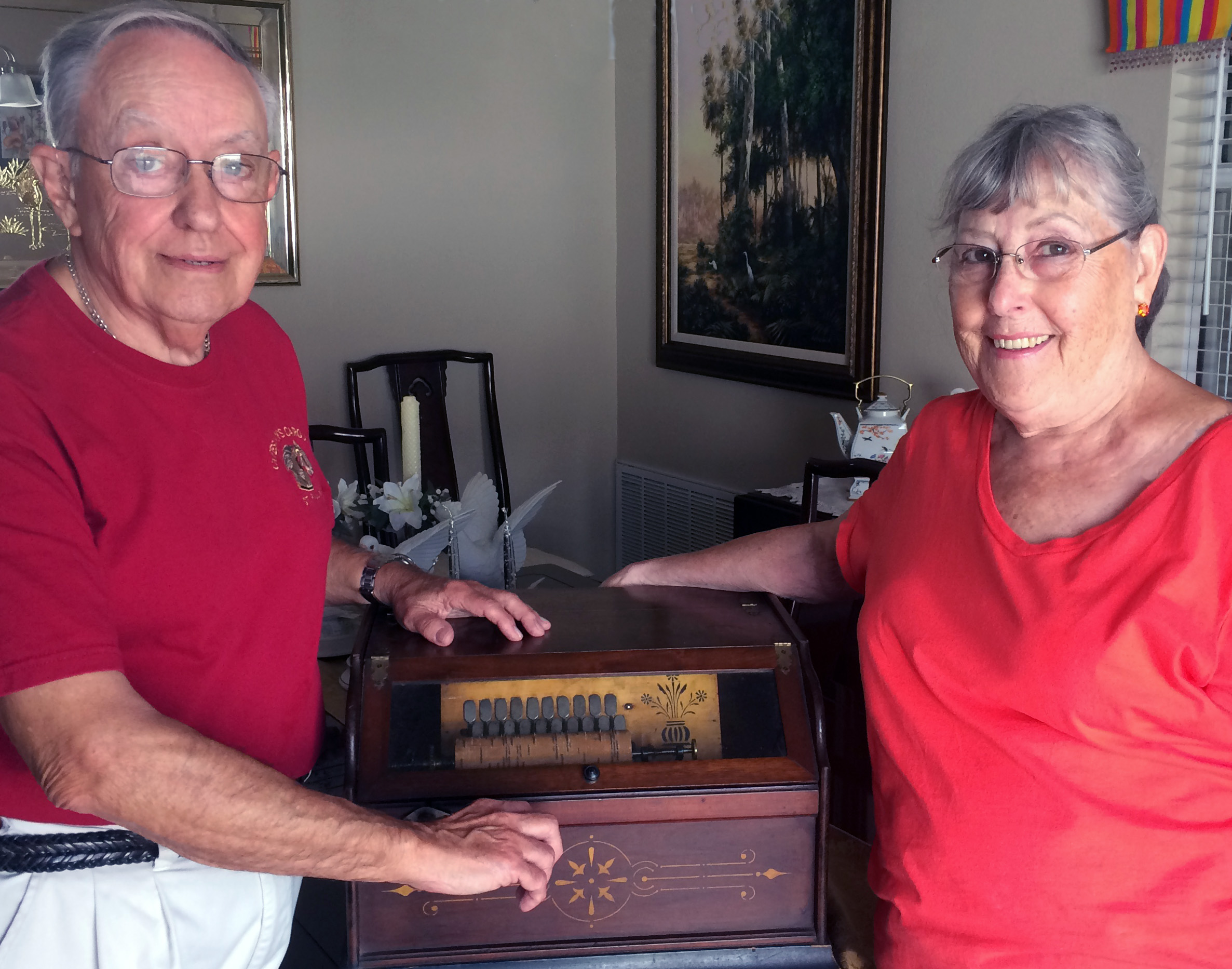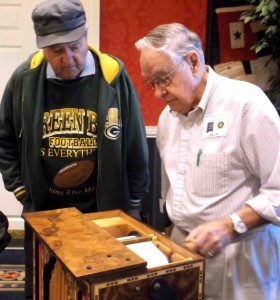Back in the late 1800s a traveling preacher might come to town to save souls with “roller organ” and a bunch of “corn cobs” strapped to his saddle. Today a vintage roller organ has a place of honor in the mechanical music machine collection of Jack and Mary Ann Hostetler in the Village of Belvedere.
“We bought the roller organ on eBay,” Jack explains. “And when it arrived it didn’t play. So, we contacted Howard Wyman, a friend who lives near Tampa. He took it apart in five minutes on his dining room table and showed us the bellows which had holes that someone had once patched with Band-aids.”
Howard replaced the bellows and the organ works again.

“The original sold for $3.29 late in the 1800s and was featured in the Sears Roebuck catalog.”
Jack, Mary Ann and Howard are all members of the Music Box Society International (MBSI), “a group of worldwide enthusiasts celebrating automated musical machines whose origin predates electrically amplified music.”
The machines they collect and admire range from full-size circus steam calliopes to carousels or merry-go-rounds with mechanical music, to delicate wind-up music boxes with ceramic figurines revolving on top.
“The later 1800s to about the 1920s were the heyday of mechanical music machines,” Mary Ann says, “After electric motors became common.” There were nickelodeons – coin operated music machines in bars, restaurants, skating rinks and dance halls – home music machines that included phonographs and gramophones, player pianos, monkey organs and very complex machines that played violins, wind and a variety of other instruments. “They were the iPods of their day.”
Some very complex machines, knows as orchestrions, play music simulating a full orchestra and were used in upscale restaurants and saloons. Some examples still exist in Europe. But Prohibition, which put the U.S. beer halls out of business, also caused the orchestrions in this country to become very rare.

Most mechanical music machines had interchangeable cartridges, cylinders, metal or Bakelite plates, or paper rolls with holes to drive the machine. Jack and Mary Ann’s roller organ had a “cob” – a yellowish cylinder (resembling a corn cob) with raised pins to open and close the organ valves. A crank handle operates the bellows and turns the cylinder. “Early preachers would have cobs with hymns that they would play during the service.”
The Hostetlers, both former IBM employees from Vestal, near Endicott, N.Y. got into music machines in 2012 after moving to The Villages.
“We had friends who invited us to join MBSI with them. We loved it immediately. We’ve been active ever since.”
They travel to MBSI events throughout Florida as well as to national conventions and are looking forward to MBSI in Detroit next year.
Jack is the vice president of the MBSI southeast chapter. Mary Ann produces their quarterly newsletter. They are also show off their music machines at events in the town squares and at the MBSI Christmas event, now in its fifth year, scheduled for Dec. 16-17 at the Eisenhower Recreation Center.
Before moving to The Villages the Hostetlers collected antique clocks.
“IBM originally was International Time Recording Company, ITR, after Mr. Watson bought out Bundy Manufacturing which had invented the mechanical time clock,” Jack says opening the door to his restored original Bundy wall clock. “Unfortunately, the company policy was to remove and destroy the time recording mechanism when the clock was replaced or updated, so now mine is now just a big clock. Although clock mechanisms are not very different than mechanical music machines,” he says.
“Our collection of clocks and music machines is limited by the space in our house,” Jack laughs.
In addition to the roller organ, their other prize piece is an Edison Home Phonograph, dating from the late 1800s, which plays music cylinders.
“It has a strong spring that we wind up to provide the power. The original cylinders were exactly two minutes long and later they came out with four-minute cylinders.” The cylinder concept was replaced with platters, or ‘records,’ early in the 1900s.
When not traveling to music machine gatherings Jack and Mary Ann indulge in their long-time pastime – dancing.
“We’ve danced for years,” Mary Ann says with enthusiasm. We polka and ballroom dance and belong to several square dance clubs. We dance three or four times a week.”
“We didn’t know there were so many square dance moves,” Jack adds. “Until we moved here we thought we knew them all. Then we found out there are hundreds more.”
Although ‘IBM’ is often referred to as ‘I’ve been moved!” by former employees, the Hostetlers don’t fall into that category. “We spent 30 years in the Endicott area,” Jack says. Over the years they both attained degrees through night classes, raised four children and rose through the ranks at IBM. Jack began as an electronics technician and eventually became a program manager. Mary Ann went to work at IBM as an expediter after the children got older and finally retired as an administrator. “I was in the last wave of employee retirement buyouts in 1992,” Jack says. He then worked as a quality assurance auditor for another company for over eight years before moving to the Clearwater, Florida area.
“It was OK, but I was bored. There weren’t enough activities,” Mary Ann says. After a couple of visits to The Villages, they moved here in 2003.
“This is our third house in The Villages,” she says.
Their daughter currently lives in the Village of Stonecrest.
The Hostetlers are looking forward to expanding the Music Box Society International to a wider audience in Florida and throughout the U.S. as well as in the Villages. Look for them in one of the town squares at the next big event and get Jack to crank up their roller organ for the sound of what music was like long before the digital age.

